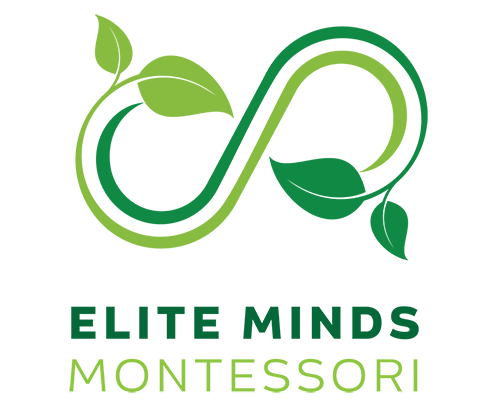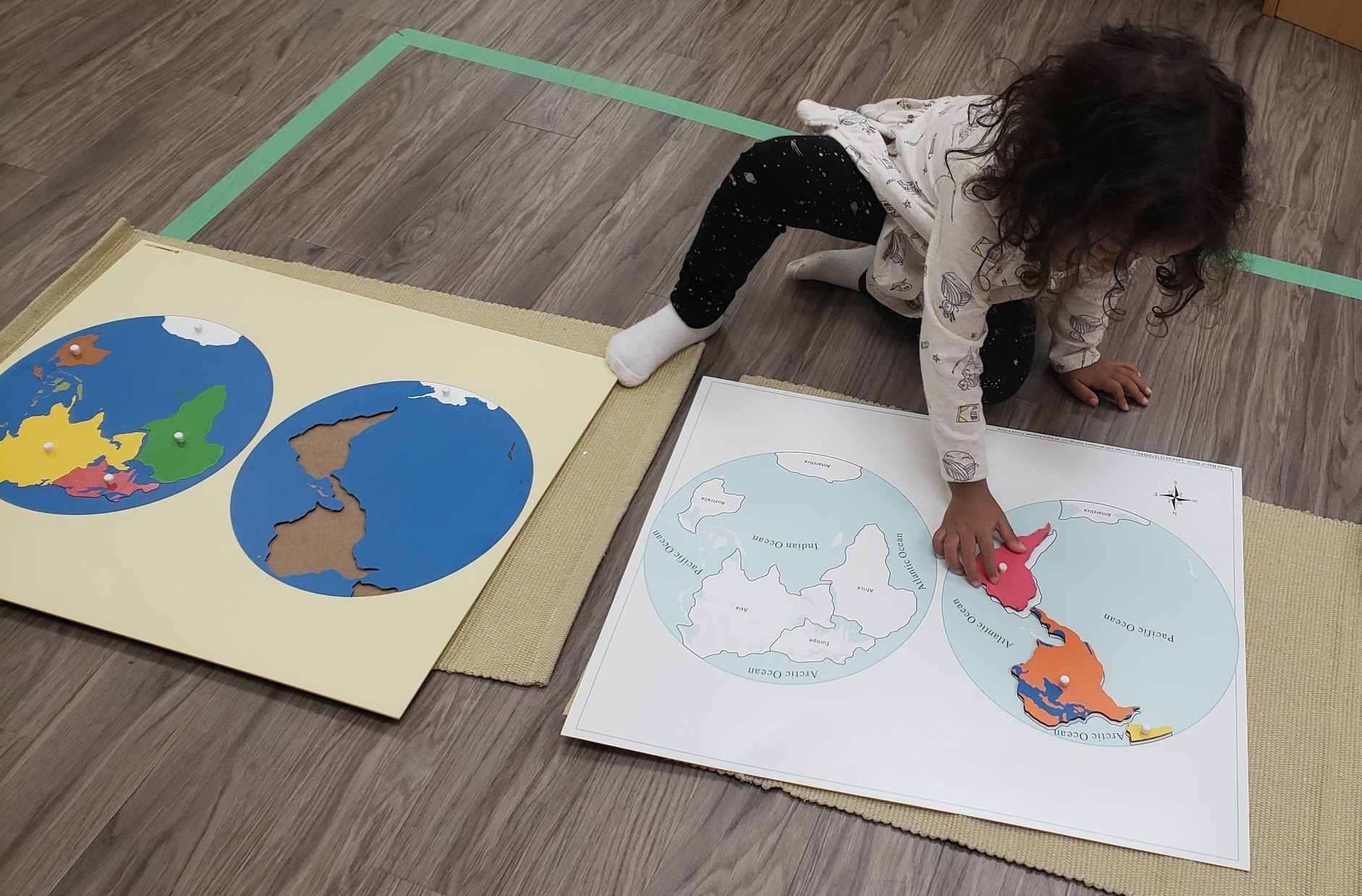“One test of the correctness of educational procedure is the happiness of the child.”
Key Philosophical Messages
That Make Montessori Unique
Deep respect for children as individuals.
Multi-age classes allow teachers to develop close and long-term relationships with their students, to know each child’s learning style well and encourage older students to become role models, mentors and leaders to younger students.
Integrated curriculum is carefully structured and connects subjects within programs; e.g., history and cultural arts to maximize the opportunity for learning and builds from program to program to progress from concrete to abstract learning.
Two to three hour uninterrupted work periods every day that increase concentration, attention and allow for creativity and innovation.
Independence is nurtured and leads to children becoming purposeful, motivated and confident in their own abilities.
Peace and conflict resolution are taught and modeled daily and children learn to be a part of a warm, respectful and supportive community.
The child creates, in a very real sense, the adult that is to be, through experiences, interactions, and environments. Character development is a central focus of the AMS Montessori curriculum.
Hands-on learning is central to the curriculum in all programs and leads to children being engaged rather than passive with their work.
The environments are responsibly and carefully prepared with multi-sensory, sequential, and self-correcting materials to support self-directed learning.
Teachers, children and parents work together as a warm and supportive community.
Self-expression is nurtured in all children. Children experience art, music, poetry, theater, writing, and other forms of creative arts with confidence and passion.
Montessori in the 21st Century.
The American Montessori Society. 2003
Desired Learner Outcomes
Common to Montessori Education
Dr. Maria Montessori, an Italian physician and educator, developed a method of teaching based on her scientific observations of young children’s behavior. Her first “Children’s House” was established in Rome in 1907. She found children learned best in a home-like environment filled with developmentally appropriate materials to provide experiences that contribute to the growth of self-motivated, independent learners.
Dr. Montessori carried her message across the globe including to the United States in 1912. Dr. Nancy Rambusch established the American Montessori Society in 1960. Montessori education in the United States appeals to those who embrace it because of its outcomes for students. The American parents who originally chose Montessori education believed it matched their views of child rearing. They saw their children as moral beings, who, over time would become the socially responsible people Montessori had envisioned. And they observed their children becoming confident, competent learners.
The outcomes we aspire to teach are lifelong developments. The original American Montessori agenda of learner outcomes
are as follows:
Independence: Is the child able to choose their own work, apply energy to that work, finish it to a personal criterion of completion, take and return the work to the place it is customarily kept, in such a way that another child will be able to find the work ready to do? Is the child able to seek help? Is the child able to locate resources to continue the self-chosen task, without necessarily involving the adult?
Confidence and Competence: Are the child’s self-perceived successes far more numerous than self-perceived failures? Is the child capable of self-correcting work, upon observation, reflection, or discussion? Can the child manage the available array of “stuff” with a clear sense of purpose?
Autonomy: Can the child accept or reject inclusion in another child’s work or work group with equanimity?
Intrinsic Motivation: Is the child drawn to continue working for the apparent pure pleasure of so doing? Does the child, once having achieved a particular competence, move on to revel in mastery by showing others?
Ability to Handle External Authority: Is the child able to accept the “ground rules” of the group as appropriate in dealings with other children? Is the child, distant from the teacher, able to function as if the teacher were nearby?
Social Responsibility: Independent and autonomous persons are always a part of a group and must attain independence and autonomy through participation in group activity. The loss of these qualities by one of a group is a loss for all. Do students attain independence and autonomy and, at the same time, develop social responsibility?
Academic Preparation: In Montessori education, children learn by doing. Academic preparation entails activation and cultivation of inherent powers and processes through which the learner becomes a supplier of meanings or of things-meaningfully-known. Academic skills are essential to learning and knowing, not the aim of learning and knowing. Do students acquire academic skills and apply them in learning to learn?
Spiritual Awareness: Montessori views the child as a spiritual embryo. Implications are conveyed by the metaphor. All humans are spiritual beings as well as physical beings. They have spiritual health as well as physical health. Montessori sees no need to establish whether or not the source of spirit is theological and does not offer theological explanation. The spiritual embryo simply thrives on spiritual investment. The investment can be theological, humane, or a combination of the two. What are the spiritual outcomes of school experience?
Citizens of the World: All children are part of both a world political system and a world ecological system. Both systems have their constitutions and all must learn to live by the letter and spirit of their laws. As a naturalist, Montessori knew about the laws of mind and of nature and understood the consequences of disobeying either of them. What are the citizenship outcomes of school experience? Are the children acquiring civic virtue? Are they acquiring dispositions to understand the natural world, to cherish it, and to live harmoniously within it?
Some Important Aspects
of the Montessori Method
1. It is based on years of patient observation and study of children by Dr. Maria Montessori, a scientist, uniquely educated and qualified for this task. She was a medical doctor, a student of psychology and a Professor of Anthropology, a science that is concerned with people in a unique way. She worked out her methods and developed the materials by letting the children show her what worked and what did not work. It is not a “franchise” or “patented” operation. It is in the public domain. There are responsible organizations such as the American Montessori Society that operate on behalf of its proper development in this country.
2. It has proven itself of universal application. Within a single generation it has been tried successfully with children of many nations. Climate, nationality, social rank or type of civilization make no difference to its successful application. India, France, Holland, England, Burma, Mexico, Panama, Colombia, Canada, Italy and the United States have many well-developed Montessori schools.
3. It has revealed the small child, as a lover of order and of intellectual work, spontaneously chosen and carried out with profound joy, capable of concentration and eager to learn for the joy of learning.
4. It is based upon the child’s impervious need to ‘learn by doing,’ which develops faculties at each stage in the child’s mental growth. These stages are called “sensitive periods” and the child more readily absorbs knowledge during those periods. While the method offers the child a maximum of spontaneity, it enables the child to reach an even higher level of scholastic attainment than under other systems.
5. Though it does away with the necessity of coercion by means of rewards and punishments, it achieves a higher discipline. It is an active discipline, which originates within the child and is achieved through concentration on chosen work. Children with extremely active and curious minds are stimulated and utilize their intellectual energies constructively.
6. It is based on a profound respect for the child’s personality and removes the preponderate influence of the adult, thus leaving room to grow in biological independence. The child is allowed a large measure of liberty (not license) and learns to handle it with responsibility.
7. It enables the teacher to work with each child individually in each subject, and thus guide according to the child’s individual requirements. Each child works at their own pace, hence the quick child is not held back by the slow, nor is the latter, in trying to keep up with the former, obliged to flounder along hopelessly out of the child’s depth. Each stone in the mental edifice is “well and truly laid” before the next is added.
8. It does away with pressure and its trail of challenges. More than this, at every turn, it presents endless opportunities among the children for mutual help--which is joyfully given and gratefully received. The child works from free choice, without pressure and coercion, is freed from strain, feeling inferior, and other experiences, which are apt to be the unconscious cause of mental conflicts in later life.
9. The Montessori method develops the whole personality of the child, not merely intellectual faculties, but also powers of deliberation, initiative, and independent choice, with their emotional complements. By living as a free member in a real social community, the child is guided in those fundamental social qualities, which form the basis of good citizenship.
10. Below is a partial list of Montessori publications available from Amazon.com or from your local bookstore.
Rita Kramer, Maria Montessori, A Biography
Dr. Maria Montessori, The Montessori Method
Dr. Maria Montessori, Dr. Montessori's Own Handbook
Dr. Maria Montessori, Secret of Childhood
A.S. Lillard, Montessori: The Science Behind the Genius
P.P. Lillard & L.L. Jessen, Montessori From the Start: The Child at Home, From Birth to Age Three
Nancy McCormick Rambusch, Learning How to Learn, An American Approach to Montessori
Dawson, P. and Guare, R. 2009. Smart but Scattered: The Revolutionary “Executive Skills” Approach to Helping Kids Reach Their Potential
Maxwell, S. 2008. The Talk: What Your Kids Need to Hear from You About Sex


